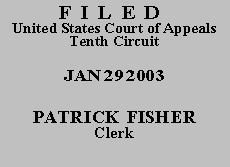

| MARGIE A. HAYES,
Plaintiff - Appellant, v. JO ANNE B. BARNHART, Commissioner, Social Security Administration, Defendant - Appellee. |
|
Plaintiff Margie A. Hayes appeals from an order of the district court affirming the Commissioner's determination that she is not entitled to Social Security disability benefits. We affirm.
We review the Commissioner's decision to determine whether her factual findings were supported by substantial evidence in light of the entire record and to determine whether she applied the correct legal standards. See Castellano v. Secretary of Health & Human Servs., 26 F.3d 1027, 1028 (10th Cir. 1994). "Substantial evidence is such relevant evidence as a reasonable mind might accept as adequate to support a conclusion." Id. (quotations omitted). In the course of our review, we may "neither reweigh the evidence nor substitute our judgment for that of the agency." Casias v. Secretary of Health & Human Servs., 933 F.2d 799, 800 (10th Cir. 1991).
Ms. Hayes alleged disability as of 1994(1) due to rheumatoid arthritis, degenerative arthritis, muscle spasms, migraine headaches, tendinitis in her elbows, and lower back pain. The administrative law judge (ALJ) determined that Ms. Hayes was not disabled at step five of the five-step sequential process, see Williams v. Bowen, 844 F.2d 748, 750-52 (10th Cir. 1988), as she could perform sedentary work.
On appeal, Ms. Hayes argues that the ALJ should have ordered a consultative psychological exam, improperly discredited her subjective complaints, and made an incorrect residual functional capacity determination. She contends the ALJ was not entitled to rely on the guidelines and the testimony of the vocational expert did not constitute substantial evidence to support the ALJ's decision that she can perform substantial gainful activity.
We have reviewed the record before this court. While not all of the evidence supports the ALJ's factual determinations, substantial evidence does. See, e.g., O'Dell v. Shalala, 44 F.3d 855, 858 (10th Cir. 1994) ("Evidence is insubstantial if it is overwhelmingly contradicted by other evidence"). That is all that is required. Further, the ALJ did not commit any reversible errors at law.
The judgment of the United States District Court for the Eastern District of Oklahoma is AFFIRMED.
Entered for the Court
Circuit Judge
*. This order and judgment is not binding precedent, except under the doctrines of law of the case, res judicata, and collateral estoppel. The court generally disfavors the citation of orders and judgments; nevertheless, an order and judgment may be cited under the terms and conditions of 10th Cir. R. 36.3.
1. Ms. Hayes' insured status expired September 30, 1998. Therefore, the relevant time period for determining her disability status is from January 12, 1994, the date she claimed she became unable to work, to September 30, 1998. See Adams v. Chater, 93 F.3d 712, 714 (10th Cir. 1996).